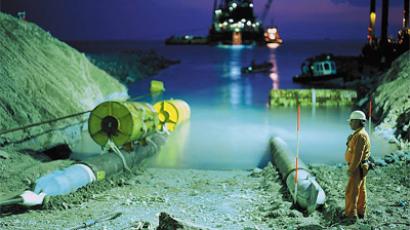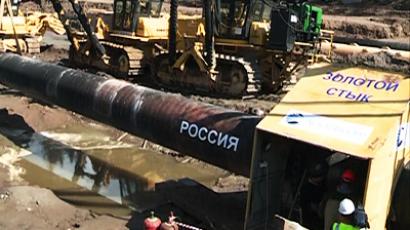'Nord Stream will make Europe more secure’
After years of waiting, Nord Stream is finally up and running. Despite critics who feared the Russian Bear was looking to take a bite out of Europe, analyst Alexander Rahr says the pipeline will do much to increase regional security.
With the launch of the Nord Stream offshore pipeline on Tuesday, Russian gas will flow directly to Europe for the first time. While critics had long argued European dependence on Russian gas would weaken the EU, Alexander Rahr, the director of the Russia-Eurasia Program at the German Council on Foreign Relations, says the pipeline will actually enhance security in the region. “I think that the Nord Stream pipeline is making energy security better for the European Union, the energy import to the European Union will be safer now because there is an extra pipeline which circumvents the difficult transit countries like Ukraine and Belarus where Russian gas has disappeared over the past 10-15 years,” affirms Rahr. In January 2009, gas supplies to 18 European countries were severely disrupted due to a dispute between Russia and Ukraine concerning the price of gas and its transit. During the dispute, it was also discovered that Ukraine had diverted gas meant for the European market for domestic consumption. Apart from ending the problems presented by unreliable transit countries, Rahr also believes that after Japan's Fukushima disaster, Europe will increasingly need diverse sources of energy as Germany phases out nuclear power. “Now people who were criticizing Nord Stream understand how important this pipeline is for the second reason, not only for security reasons, but also for getting more gas from Russia, because after Germany closes down all of the nuclear stations over the next 10 years we will need, of course, more gas,” he says. Ultimately, Rahr believes Nord Stream will help “integrate Europe and Russia into a common energy space,” which he argues can be used as a platform for deepening relations on a variety of fronts.“If this space will be successful, then we can think about creating a common economic space, a free trade zone, and politically come much closer together, so, from my point of view, the energy alliance, which is being symbolized by this pipeline as well, will help us to build a common continent and make Europe more stable than it had been before."
Oil and gas expert Indra Overland believes the launch of Nord Stream disposes of all the skeptical arguments leveled at the project.“The main arguments were environmental – that laying a pipeline on a seabed would be dangerous in relation to archeological treasures, in relation to left-over weapons from World War II, and so on and so forth,” he told RT. “And I think the successful implementation of this project shows what always has been quite clear – these critical standpoints did not have much basis in reality. They were driven by some kind of prejudices or some kind of motives – it is difficult to say exactly what – probably different motives for different actors. Now we see the project has been implemented successfully, there have not been any major problems, and the criticism has gone silent.”
Senior analyst at the Center for Global Energy Studies in London Julian Lee believes the first line of direct communication between Russia and Europe, which is only a fraction of the capacity of its gas lines running across Ukraine, will enable Russia to become a major gas supplier to Europe. Even though Europe looks for the diversification of its suppliers. “There is an overriding view within Europe that diversification is important and this is a thing we heard echoed for many years now,” he told RT. “But within that it is generally recognized within Europe and I don’t think there is any dissenting voice anywhere in Europe, that Russia is now and always will be a principal provider of gas to the European continent. It is simply a vast repository of natural gas resources. It is on Europe’s eastern border. It has very stable long-term gas-supply relationships with the European countries and nobody is looking to supplant Russian gas. What Europe wants to do is to ensure that gas comes from other places by other routes in addition to Russian gas but not instead of it.”














